高中英语必修四unit4Reading(共60张PPT)
合集下载
人教高中英语必修4Unit4 reading(共23张PPT)
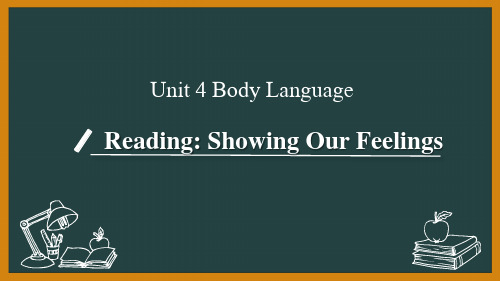
4._l_o_o_k_i_n_g__a_w__ay 5.standing ___f_r_o_m__p_e_ople a little
u__p__a_n__d__d_o_w_ n or yawning distance
summary
to show _h_a_p_p_in__es_s_or
to show
Scanning for specific information
Para 4, 5, 6. Showing different feelings with action
Match the body languages with each description
agreement
shaking head side to side
nodding head up and down turn toward and look at it
Scanning for specific information
Para7. Some similarities in body language
According to the last paragraph, what can we infer? A. We can communicate successfully with others using body language. B. People from different countries will not misunderstand each other using body language. C. We should try to learn more about other countries' customs. D. All around the world, people express the same ideas using the same body language.
人教高中英语必修4Unit4readingPPT课堂课件(28页)
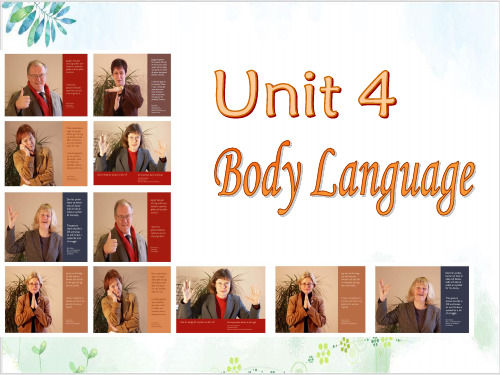
人教高中英语必修4Unit4readingPPT 课堂课 件(28页 )( -精精品品P)PT课 件
Fill in the table according to Para4:
Read it together.
People in the country/area
English people
People from Spain, Italy and South
Tony approached Julia, _t_o_u_c_h_e_dher shoulder and __k_is_s_e_d_ her on the cheek . Julia stepped back
appearing surprised. Akira Nagata from Japan came in smiling at the same time with George Cook from Canada. As they were
Part 1 (Para. 1)
People from different countries
A
have different body language.
Part 2 (Para. 2-4 )
B Summary of body language.
Part 3 (Para. 5 )
I went to the Airport to meet the
country
Columbia Britain Japan Canada Jordan France
人教高中英语必修4Unit4readingPPT 课堂课 件(28页 )( -精精品品P)PT课 件
Find out the two cultural mistakes in Para2
人教高中英语必修4Unit4reading(共25张PPT)

3.shakes hands
4.approaches others closely and touches their shoulder and kisses them on the cheek
George(Canada)
Ahmed Aziz(Jordan)
Coulon(France)
5.does not stand very close to others or touch strangers
world
_S_h__a_k_e_h_a_nds
Writing
• Mr Yu, our physical teacher, will travel around the world. Please write a letter to Mr Yu to tell him some tips about the different greeting ways in those foreign countries.
Task6: Summary of body language
People in the country/area
Ways to greet each other
Englis_r_y__c_lo_s_e_to
others or touch _s_tr_a_n_g_e_r_s when they meet.
Character
Tony Garcia Julia Smith Akira Nagata George Cook
Ahmed Aziz Darlene Coulon
I
Country
Columbia Britain
Japan Canada Jordan France China
4.approaches others closely and touches their shoulder and kisses them on the cheek
George(Canada)
Ahmed Aziz(Jordan)
Coulon(France)
5.does not stand very close to others or touch strangers
world
_S_h__a_k_e_h_a_nds
Writing
• Mr Yu, our physical teacher, will travel around the world. Please write a letter to Mr Yu to tell him some tips about the different greeting ways in those foreign countries.
Task6: Summary of body language
People in the country/area
Ways to greet each other
Englis_r_y__c_lo_s_e_to
others or touch _s_tr_a_n_g_e_r_s when they meet.
Character
Tony Garcia Julia Smith Akira Nagata George Cook
Ahmed Aziz Darlene Coulon
I
Country
Columbia Britain
Japan Canada Jordan France China
人教高中英语必修4Unit4 readingPPT课堂课件(18页)
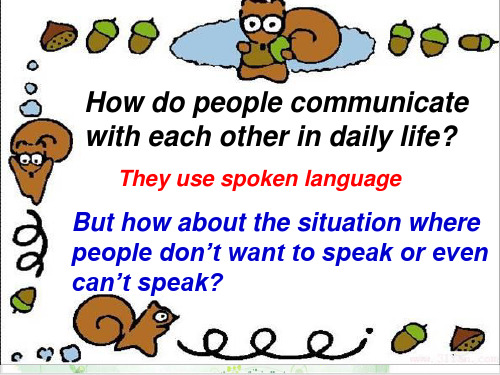
F. Policeman walked towards them.
人教高中英语必修4Unit4 readingPPT课堂课件(18页)( -精精品品PP)T课 件
人教高中英语必修4Unit4 readingPPT课堂课件(18页)( -精精品品PP)T课 件
Let’s retell the story
人教高中英语必修4Unit4 readingPPT课堂课件(18页)( -精精品品PP)T课 件
Part one: fill in the blanks. When we say “express yourself ”, we mean
that you show the way you__f_e_e_l__ about something. Your _r_e_a_c_t_io__n! There are two ways to express yourself by__d_o__in__g_ or by __s_a_y_i_n_g_. Showing your reaction by doing normally means__u__s_in__g_ your body. Maybe the _e_x_p_r_e_s_s_i_o_n_ on your face will __c_h_a_n_g__e_ but you say nothing. You “__p_u__ll__ a face”. Maybe you __w_a__v_e_ your arms around in __a_n_g_e_r_. Perhaps you___s_t_a_m__p_ your foot. Maybe you __j_u_m__p___ up and down, or perhaps you simply __w_a__lk_ _a_w__a_y_.
人教高中英语必修4Unit4 readingPPT课堂课件(18页)( -精精品品PP)T课 件
人教高中英语必修4Unit4 readingPPT课堂课件(18页)( -精精品品PP)T课 件
Let’s retell the story
人教高中英语必修4Unit4 readingPPT课堂课件(18页)( -精精品品PP)T课 件
Part one: fill in the blanks. When we say “express yourself ”, we mean
that you show the way you__f_e_e_l__ about something. Your _r_e_a_c_t_io__n! There are two ways to express yourself by__d_o__in__g_ or by __s_a_y_i_n_g_. Showing your reaction by doing normally means__u__s_in__g_ your body. Maybe the _e_x_p_r_e_s_s_i_o_n_ on your face will __c_h_a_n_g__e_ but you say nothing. You “__p_u__ll__ a face”. Maybe you __w_a__v_e_ your arms around in __a_n_g_e_r_. Perhaps you___s_t_a_m__p_ your foot. Maybe you __j_u_m__p___ up and down, or perhaps you simply __w_a__lk_ _a_w__a_y_.
人教高中英语必修4Unit4 Reading(共26张PPT)
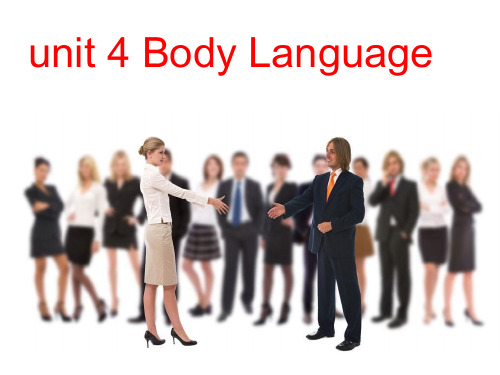
The first mistake
Mr. Garcia from Columbia
Julia Smith
from __B_r_it_a_i_n___
He approaches Ms Smith by_to_u__c_h_i_n_g h_e_r__ s_h_o__u_ld__e_r__ and _k_i_s_s_e_d her on the _c_h_e_e_k____.
奋斗的路上,时间总是过得很快,目前的困难和麻烦是很多,但是只要不忘初心,脚踏实地一步一步的朝着目标前进,最后的结局交给时间 来定夺。 天气影响身体,身体决定思想,思想左右心情。 在所阅读的书本中找出可以把自己引到深处的东西,把其他一切统统抛掉,就是抛掉使头脑负担过重和会把自己诱离要点的一切。 努力向上的开拓,才使弯曲的竹鞭化作了笔直的毛竹。 痛不痛只有自己知道,变没变只有自己才懂。不要问我过得好不好,死不了就还好。 不可压倒一切,但你也不能被一切压倒。 现实的压力压的我们喘不过气也压的我们走向成功。 我不去想是否能够成功,既然选了远方,便只顾风雨兼程。 不要因为众生的愚疑,而带来了自己的烦恼。不要因为众生的无知,而痛苦了你自己。 让珊瑚远离惊涛骇浪的侵蚀吗?那无异是将它们的美丽葬送。 经验是由痛苦中粹取出来的。 人,最大的敌人是自己。 我为你今天的表现感到骄傲。 无所求则无所获。 自然界没有风风雨雨,大地就不会春华秋实。 只要你确信自己正确就去做。做了有人说不好,不做还是有人说不好,不要逃避批判。
She __s_ta__n_d_s_ _b__a_c_k___ appearing _s_u_r_p_r_is_e_d___ and put up her hands as if __i_n__d_e_f_e_n_s_e_____.
人教高中英语必修4Unit4readingPPT课堂课件(15页)

名词短语在句中作__主____语,谓语动词用 单 数。
① _C__o_ll_e_c_ti_n_g_(collect) stamps is my hobby. ②___L_y_i_n_g___(lie) is wrong. (2) in most cases 在多数情况下;往往 ① Journalists have a sixth sense of news in most cases.
句中的we do 代指understand,用do/did/dose代 替前面出现的动词,以避免重复。
(1)He studies hard as well as I __d_o____. (2)She plays the violin better than she did in
the past. (3)She does not like playing ping pong, but
人教高中英语必修4Unit4readingPPT 课堂课 件(15页 )( -精精品品P)PT课 件
人教高中英语必修4Unit4readingPPT 课堂课 件(15页 )( -精精品品P)PT课 件
5. so it is an amazing thing that we understand each other as well as we do!
her brother does .
人教高中英语必修4Unit4readingPPT 课堂课 件(15页 )( -精精品品P)PT课 件
人教高中英语必修4Unit4readingPPT 课堂课 件(15页 )( -精精品品P)PT课 件
Summary
1. means 用法 2. even if 引导让步状语从句
There are differences in body language, and it’s important for us to know them.
① _C__o_ll_e_c_ti_n_g_(collect) stamps is my hobby. ②___L_y_i_n_g___(lie) is wrong. (2) in most cases 在多数情况下;往往 ① Journalists have a sixth sense of news in most cases.
句中的we do 代指understand,用do/did/dose代 替前面出现的动词,以避免重复。
(1)He studies hard as well as I __d_o____. (2)She plays the violin better than she did in
the past. (3)She does not like playing ping pong, but
人教高中英语必修4Unit4readingPPT 课堂课 件(15页 )( -精精品品P)PT课 件
人教高中英语必修4Unit4readingPPT 课堂课 件(15页 )( -精精品品P)PT课 件
5. so it is an amazing thing that we understand each other as well as we do!
her brother does .
人教高中英语必修4Unit4readingPPT 课堂课 件(15页 )( -精精品品P)PT课 件
人教高中英语必修4Unit4readingPPT 课堂课 件(15页 )( -精精品品P)PT课 件
Summary
1. means 用法 2. even if 引导让步状语从句
There are differences in body language, and it’s important for us to know them.
人教高中英语必修4Unit4 reading (共16张PPT)PPT
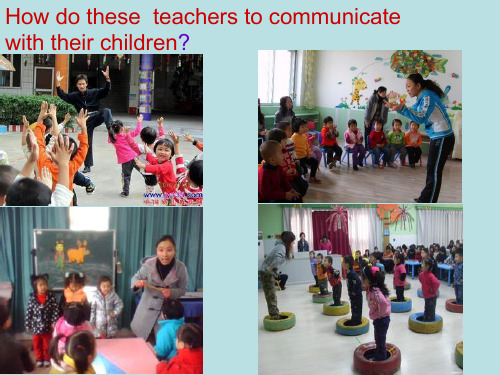
人教高中英语必修4Unit4 reading (共16张PPT)
人教高中英语必修4Unit4 reading (共16张PPT)
According to the passage:
1、Dose smile always show happiness ?
Some times we use smile to hide other feelings.
人教高中英语必修4Unit4 reading (共16张PPT)
words and expressions:
touch, shake, smile, nod, yawn, kiss, hug ,touch
Skimming
Divide the text into three parts and match the main idea with each part.
Part 1 (Para 1)
examples of some body language.
Part 2
There are differences in body
surprise anger
fear
joy
sadness
disgust contempt 厌恶 轻视
人教高中英语必修4Unit4 reading (共16张PPT) 人教高中英语必修4Unit4 reading (共16张PPT)
人教高中英语必修4Unit4 reading (共16张PPT)
How do these teachers to communicate with their children?
GAME : Guess what I want to say!
You’re great!
人教高中英语必修4Unit4reading(共18张PPT)PPT
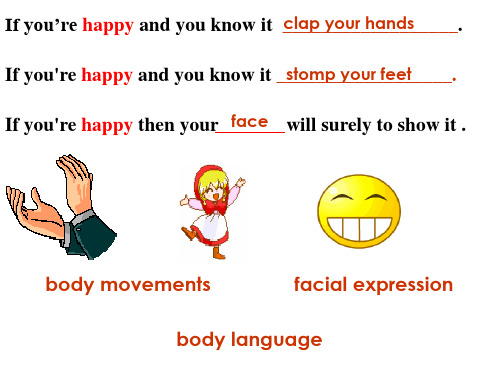
_h_a_pp_i_n_ess and put people _a_t e_a_se__.
Do smiles always mean happiness ?
However, smiles around the world can be _fa_l_se_, _h_id_in_g other feelings.
summary
similar body language
Para 2
1.smile and truly happy
Para 3
Para 4
2._fr_o_w__n_in_g 3.nodding
or turning the head
one’s
_u_p__a_n_d___
_b_a_c_k__ to _d_o_w__n
uninterested or bored
Turning toward and looking at
I am _in_t_er_e_s_t_e_d_
r_o_ll_in_g eyes and I don’t b_e_li_e_v_e or I don’t turning head away like it
a_g_r_e_em__e_n_t bored
_
attitude
to show
_r_e_s_p_e_c_t_
人教高中英语必修4Unit4reading(共1 8张PPT )
人教高中英语必修4Unit4reading(共1 8张PPT )
smile
show happiness put people at ease
Page 6
Careful reading
Part II similar body language
Do smiles always mean happiness ?
However, smiles around the world can be _fa_l_se_, _h_id_in_g other feelings.
summary
similar body language
Para 2
1.smile and truly happy
Para 3
Para 4
2._fr_o_w__n_in_g 3.nodding
or turning the head
one’s
_u_p__a_n_d___
_b_a_c_k__ to _d_o_w__n
uninterested or bored
Turning toward and looking at
I am _in_t_er_e_s_t_e_d_
r_o_ll_in_g eyes and I don’t b_e_li_e_v_e or I don’t turning head away like it
a_g_r_e_em__e_n_t bored
_
attitude
to show
_r_e_s_p_e_c_t_
人教高中英语必修4Unit4reading(共1 8张PPT )
人教高中英语必修4Unit4reading(共1 8张PPT )
smile
show happiness put people at ease
Page 6
Careful reading
Part II similar body language
人教高中英语必修4Unit4 reading(共35张PPT)

mother
Let's review
the developing country
the opening ceremony a fascinating city
attributive
artists creating wall paintings
dancers giving street performances
dancers giving street performances
the police keeping the society in order
workers building
the stadium
♦They all tried their best in their fields. ♦They contributed to a fascinating Rio.
♦Fu Yuanhui had practiced swimming for years.
♦Fu Yuanhui won the third place in the butterfly stroke.
H__a_v_i_n_g__p__r_a_c_t_i_c_e_d_swimming for years, Fu Yuanhui won the third place in the butterfly stroke.
♦41 years old Gina didn't have enough money to cure her sick son, so she took part in gymnastics game, which made her a great mother.
N_o_t_h_a_v_in_g_e_n_o_u_g_h_m_o_n_e_yto cure her sick son, 41 years old Gina took part in gymnastics game,m__a_ki_n_g_h_e_r_a_g_r_ea_t____.
Let's review
the developing country
the opening ceremony a fascinating city
attributive
artists creating wall paintings
dancers giving street performances
dancers giving street performances
the police keeping the society in order
workers building
the stadium
♦They all tried their best in their fields. ♦They contributed to a fascinating Rio.
♦Fu Yuanhui had practiced swimming for years.
♦Fu Yuanhui won the third place in the butterfly stroke.
H__a_v_i_n_g__p__r_a_c_t_i_c_e_d_swimming for years, Fu Yuanhui won the third place in the butterfly stroke.
♦41 years old Gina didn't have enough money to cure her sick son, so she took part in gymnastics game, which made her a great mother.
N_o_t_h_a_v_in_g_e_n_o_u_g_h_m_o_n_e_yto cure her sick son, 41 years old Gina took part in gymnastics game,m__a_ki_n_g_h_e_r_a_g_r_ea_t____.
人教高中英语必修4Unit4reading(共27张PPT)

• This saying means that when we are in a certain place, we should follow the customs of the people who live in that place, not our own customs.
• .What can you learn from this passage?
country. C.When you are in a foreign country,using body language in a correct way is important even though you know the language they speak very well,for it can make your stay in the country
• He noticed that the Colombian man kissed the British woman, but in her culture, a kiss from a stranger is not acceptable. He also noticed that the Japanese man bowed just as the Canadian man started to shake hands, so one man’s nose touched the other man’s hand.
• 3. Who seemed to prefer to keep more physical distance from others? Who seemed to prefer closer physical distance ?
• The British woman, Julia, and probably the Canadian man, George, seemed to prefer to keep more physical distance from others. The Colombian man, Tony, and the Jordanian man, Ahmed, seemed to prefer closer physical distance .
• .What can you learn from this passage?
country. C.When you are in a foreign country,using body language in a correct way is important even though you know the language they speak very well,for it can make your stay in the country
• He noticed that the Colombian man kissed the British woman, but in her culture, a kiss from a stranger is not acceptable. He also noticed that the Japanese man bowed just as the Canadian man started to shake hands, so one man’s nose touched the other man’s hand.
• 3. Who seemed to prefer to keep more physical distance from others? Who seemed to prefer closer physical distance ?
• The British woman, Julia, and probably the Canadian man, George, seemed to prefer to keep more physical distance from others. The Colombian man, Tony, and the Jordanian man, Ahmed, seemed to prefer closer physical distance .
人教高中英语必修4Unit4reading(共19张PPT)
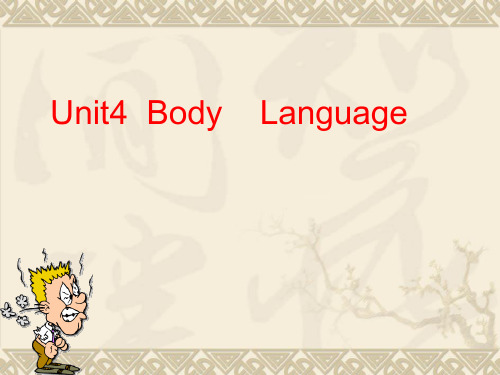
C
international students.
While-reading
When: ___y_e_s_t_e_r_d_a_y_______________ Who: ___a_n_o_t_h_e_r__s_t_u_d_e_n_t_a__n_d__I,_______ ____th__is__y_e_a_r_’_s_i_n_t_e_r_n_a_t_io_n__a_l _s_tu__d_e_n_t_s____ Where: t_h_e__C_a_p_i_t_a_l_In__te_r_n_a__ti_o_n_a_l_A__ir_p_o__rt__ What to do: __W__e__w_o_u__ld__t_a_k_e_t_h_e_m___fi_r_s_t_t_o_ ____t_h_e_ir__d_o_r_m__it_o_r_i_e_s_a_n__d_t_h_e_n__t_o__th__e_____ ____s_t_u_d_e_n__t _c_a_n_t_e_e_n_.____________________
a Japanese
George Cook (Canada)
Julia Smith (Britain)
Mr. Garcia (Columbia)
Reading
Communication: No problem?
Skimming
Match the right main idea of each part.
Pre-reading
And this is your performance, do you want to know what happened on Capital International Airport, and how do these foreigners greet with each other. Now let’s take look at the passage on Page 26.
international students.
While-reading
When: ___y_e_s_t_e_r_d_a_y_______________ Who: ___a_n_o_t_h_e_r__s_t_u_d_e_n_t_a__n_d__I,_______ ____th__is__y_e_a_r_’_s_i_n_t_e_r_n_a_t_io_n__a_l _s_tu__d_e_n_t_s____ Where: t_h_e__C_a_p_i_t_a_l_In__te_r_n_a__ti_o_n_a_l_A__ir_p_o__rt__ What to do: __W__e__w_o_u__ld__t_a_k_e_t_h_e_m___fi_r_s_t_t_o_ ____t_h_e_ir__d_o_r_m__it_o_r_i_e_s_a_n__d_t_h_e_n__t_o__th__e_____ ____s_t_u_d_e_n__t _c_a_n_t_e_e_n_.____________________
a Japanese
George Cook (Canada)
Julia Smith (Britain)
Mr. Garcia (Columbia)
Reading
Communication: No problem?
Skimming
Match the right main idea of each part.
Pre-reading
And this is your performance, do you want to know what happened on Capital International Airport, and how do these foreigners greet with each other. Now let’s take look at the passage on Page 26.
人教版高中英语必修四 unit 4 reading 课件

parts and match the main idea.
Part 1.
A.Examples of cultural
(para. 1)
“___b_o_d_y__la_n_g_u_a_g__e______ ”.
Part 2 (para. 2 &3 )
Part 3. (para. 4 )
Part 4. (para. 5)
B.Different people have different__b_o_d_y_l_a_n_g_u_a_g_e_s__ .
C.Summary of_b__o_d_y_l_a_n_g_u_a_g sent (went) to
_t_h_e_C__a_p_it_a_l _In_t_e_r_n_a_ti_o_n_a_l_A_i_rport
to meet this year’s international
students.
9
Task 2 Discuss and try to sum up the main idea:
This text mainly talks about that differentc_o_u_n_t_ri_e_s_/c_u__lt_u_re_s_/_p_e_ople have differentb_o_b_y____ languages.
bowing
everyone
7
Name Description
Body
To Whom
Language
George Cook
Ahmed Aziz
man from Canada
man from Jordan
shaking hands
shaking hands nodding
人教高中英语必修4Unit4Reading (共28张PPT)

Character
Country
ToTnoynGyaGrcairaci(aColumbia)----kCiossluomn bthiae cheek
JulJiaulSiamSitmh i(tBh ritain)----
doesn't want Britain
others to touch her
AkAirkairNa aNgaagtaat(aJapan)---- boJwapan
well done
happy
Please call me!
unit4 BOdy language Reading
Communication:
No problem?
step 1 Fast reading
find the characters and where they are from?
Character
Country
ToTnoynGyaGrcairaci(aColumbia)----kCiossluomn bthiae cheek
JulJiaulSiamSitmh i(tBh ritain)----
doesn't want Britain
others to touch her
AkAirkairNa aNgaagtaat(aJapan)---- boJwapan
para 1
1. who is the author? He/She was the representative of Beijing University's student association.
2. why did the author go the airport? and what did he or she see there?
人教高中英语必修4Unit4reading(共20张PPT)
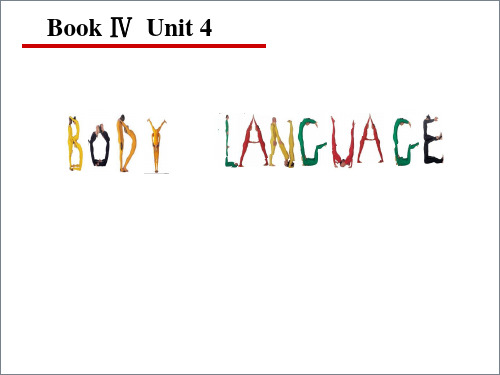
Summary
Columbia & Britain Japan & Canada Jordan & China
France & Colombia
Body languages differ from country
to country.
"Some body languages are good, while some are bad."
Greetings
1
2
Tony
Julia
Akira
George
Aziz
writer
3
Tony
Coulon
4
Greeting 1
Tony Julia
Байду номын сангаас
approached touched kissed
stepped surprised hands in defence
Columbia & Britain misunderstanding
{
Greeting 4
Tony Coulon
Colombia
France
shook hands & kissed
Englishman
Spain, Italy, South
America
do not stand very close
approach closely are more likely to touch
Character Tony Garcia
Julia Smith Akira Nagata George Cook Ahmed Aziz
Darlene Coulon the writer
- 1、下载文档前请自行甄别文档内容的完整性,平台不提供额外的编辑、内容补充、找答案等附加服务。
- 2、"仅部分预览"的文档,不可在线预览部分如存在完整性等问题,可反馈申请退款(可完整预览的文档不适用该条件!)。
- 3、如文档侵犯您的权益,请联系客服反馈,我们会尽快为您处理(人工客服工作时间:9:00-18:30)。
B. Men and women use different body languages in foreign countries.
C. Different cultures have different body languages.
D. There are different kinds of cultures in the world.
5. “When in Rome, do as the Romans do.” What do you think this famous saying means? This saying means that when we are in a certain place, we should follow the customs of the people who live in that place, not our own customs.
bowing
everyone
Name Description Body
To
Language Whom
George Cook
man from Canada
shaking hands everyone
Ahmed man from shaking hands to men
Aziz an nodding
noticed that the Japanese man bowed just as the Canadian man started to shake hands, so one man’s nose touched the other man’s hand.
3. Who seemed to prefer to keep more physical distance from others? Who seemed to prefer closer physical distance?
George Cook (Canada)
Julia Smith (Britain)
Tony Garcia (Columbia)
First-reading
I. While reading, please try to divide the whole passage into several parts and find out the main idea. Part 1. (Para. 1) Meet the visitors at the airport.
Canada shake hands
Japan bow
Spain, Italy, approach others closely South and are more likely to
American touch them countries
France shake hands and kiss each
to women
Darlene woman Coulon from
France
shake hands people she and kiss twice knows on each cheek
Country/ Area
Ways to greet each other
Britain
shake hands, do not stand very close to others or touch strangers when they meet
1. Englishmen often stand close to others or touch strangers as soon as they meet. F
2. Most people around the world F now greet each other by kissing.
Part 2 (Para. 2 and 3) People from different countries express greetings in different ways.
Part 3. (Para. 4) Different peoples have different body languages.
2. What were the two mistakes that the author noticed? He noticed that the Colombian man kissed the British woman, but the British woman stepped back and put up her hands as if in defence. He also
C. People from Britain and from South American countries seem to prefer to keep more physical distance from others.
D. Not knowing foreign customs may cause a cultural mistake.
3. There are many different ways to greet someone using words. How many ways can you think of to greet someone if you cannot speak?
Ways to greet someone without words: smile, wave, shake hands, hug, kiss, etc.
other twice on each cheek
(men from) Middle East
and other Muslim cultures
shake hands and stand quite close to other men, nod to women and do not shake hands with them
Post-reading
I. Answer the following questions. 1. Is the author of this passage male or
female? How do you know? The author is male. Ahmed Aziz will not shake hands with women, but he shakes hands with the author.
人教课标版 高一 必修 4 Unit 4
Unit 4 Reading Communication: No problem?
Brainstorming
1. What is the purpose of language? The purpose of language is to communicate with other people.
Part 4. (Para. 5) Summary of body language.
II. How do different international students behave when they greet people? Complete the chart with information from the passage.
For example, if we’re angry, we might turn away and not talk to others. If we’re happy to see someone, we might smile and hold out our hands or open our arms.
handshake
kiss
bow
hug
nod
blow a kiss
Reading
Look at the picture and the title of the passage on page 26. What do you think the topic will be?
JapaneseAkira Nagata
3. From the passage we know, most international students greet others by ______. A. shaking hands B. bowing C. kissing D. touching shoulders
4. When writing the text, the author is___. A. encouraging readers to do something B. informing readers of something C. drawing readers attention to some western countries D. regretting cultural difference
4. Did any students have similar greeting customs? If so, which ones? Yes. Tony from Colombia and Darlene from France had a similar greeting custom—a kiss. George from Canada and Ahmed from Jordan also had a similar greeting custom—a handshake, but Ahmed shakes hands only with men.
The British woman, Julia, and probably the Canadian man, George, seemed to prefer to keep more physical distance from others. The Colombian man, Tony, and the Jordanian man, Ahmed, seemed to prefer closer physical distance.
C. Different cultures have different body languages.
D. There are different kinds of cultures in the world.
5. “When in Rome, do as the Romans do.” What do you think this famous saying means? This saying means that when we are in a certain place, we should follow the customs of the people who live in that place, not our own customs.
bowing
everyone
Name Description Body
To
Language Whom
George Cook
man from Canada
shaking hands everyone
Ahmed man from shaking hands to men
Aziz an nodding
noticed that the Japanese man bowed just as the Canadian man started to shake hands, so one man’s nose touched the other man’s hand.
3. Who seemed to prefer to keep more physical distance from others? Who seemed to prefer closer physical distance?
George Cook (Canada)
Julia Smith (Britain)
Tony Garcia (Columbia)
First-reading
I. While reading, please try to divide the whole passage into several parts and find out the main idea. Part 1. (Para. 1) Meet the visitors at the airport.
Canada shake hands
Japan bow
Spain, Italy, approach others closely South and are more likely to
American touch them countries
France shake hands and kiss each
to women
Darlene woman Coulon from
France
shake hands people she and kiss twice knows on each cheek
Country/ Area
Ways to greet each other
Britain
shake hands, do not stand very close to others or touch strangers when they meet
1. Englishmen often stand close to others or touch strangers as soon as they meet. F
2. Most people around the world F now greet each other by kissing.
Part 2 (Para. 2 and 3) People from different countries express greetings in different ways.
Part 3. (Para. 4) Different peoples have different body languages.
2. What were the two mistakes that the author noticed? He noticed that the Colombian man kissed the British woman, but the British woman stepped back and put up her hands as if in defence. He also
C. People from Britain and from South American countries seem to prefer to keep more physical distance from others.
D. Not knowing foreign customs may cause a cultural mistake.
3. There are many different ways to greet someone using words. How many ways can you think of to greet someone if you cannot speak?
Ways to greet someone without words: smile, wave, shake hands, hug, kiss, etc.
other twice on each cheek
(men from) Middle East
and other Muslim cultures
shake hands and stand quite close to other men, nod to women and do not shake hands with them
Post-reading
I. Answer the following questions. 1. Is the author of this passage male or
female? How do you know? The author is male. Ahmed Aziz will not shake hands with women, but he shakes hands with the author.
人教课标版 高一 必修 4 Unit 4
Unit 4 Reading Communication: No problem?
Brainstorming
1. What is the purpose of language? The purpose of language is to communicate with other people.
Part 4. (Para. 5) Summary of body language.
II. How do different international students behave when they greet people? Complete the chart with information from the passage.
For example, if we’re angry, we might turn away and not talk to others. If we’re happy to see someone, we might smile and hold out our hands or open our arms.
handshake
kiss
bow
hug
nod
blow a kiss
Reading
Look at the picture and the title of the passage on page 26. What do you think the topic will be?
JapaneseAkira Nagata
3. From the passage we know, most international students greet others by ______. A. shaking hands B. bowing C. kissing D. touching shoulders
4. When writing the text, the author is___. A. encouraging readers to do something B. informing readers of something C. drawing readers attention to some western countries D. regretting cultural difference
4. Did any students have similar greeting customs? If so, which ones? Yes. Tony from Colombia and Darlene from France had a similar greeting custom—a kiss. George from Canada and Ahmed from Jordan also had a similar greeting custom—a handshake, but Ahmed shakes hands only with men.
The British woman, Julia, and probably the Canadian man, George, seemed to prefer to keep more physical distance from others. The Colombian man, Tony, and the Jordanian man, Ahmed, seemed to prefer closer physical distance.
